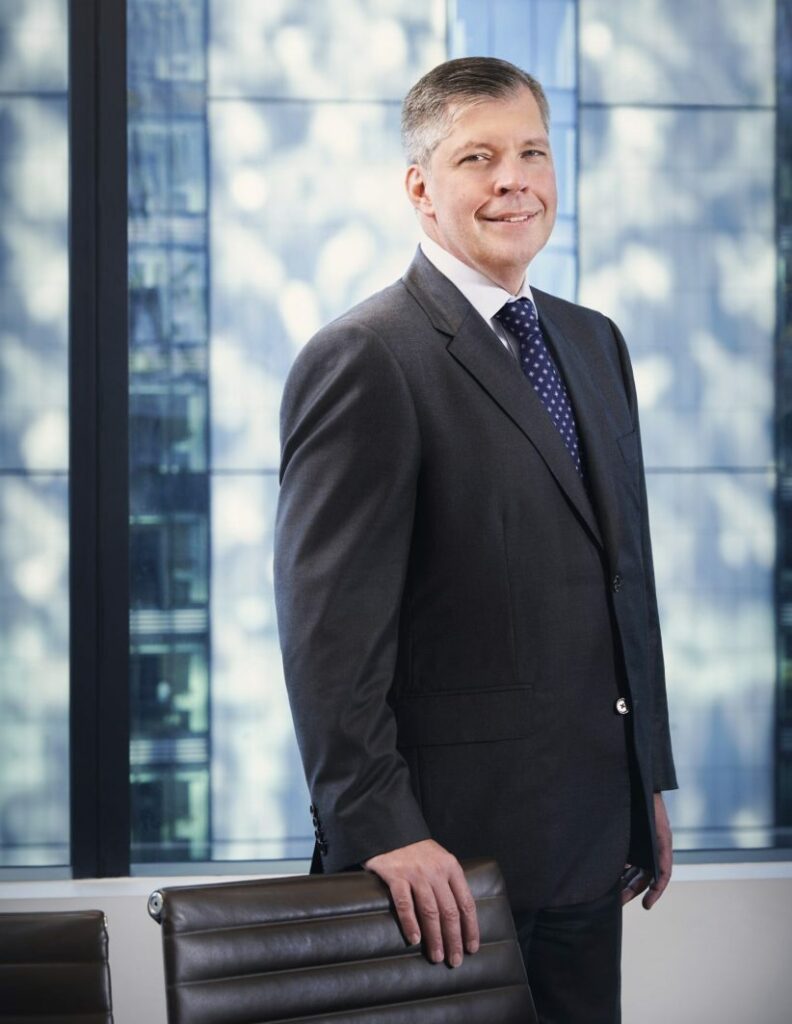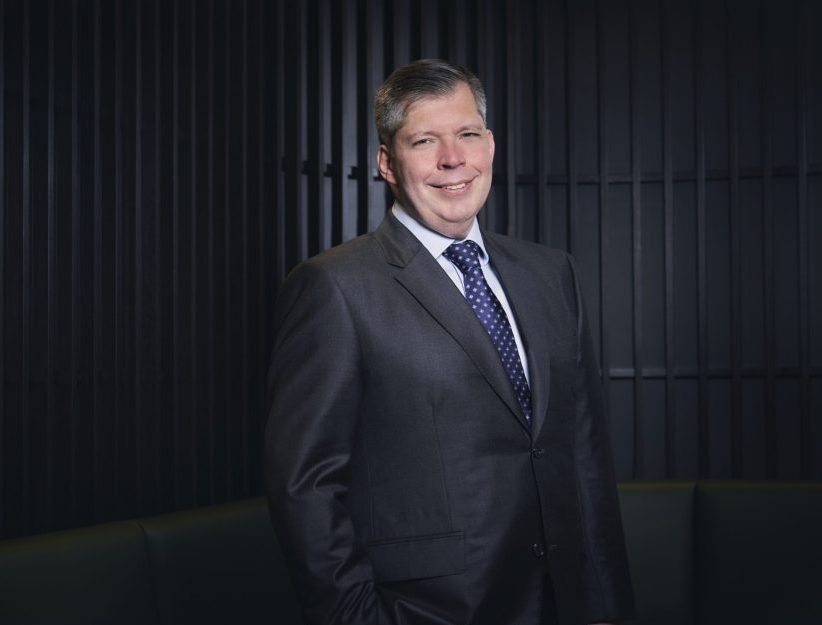Kent Griffin grew up in the industrial town of Newcastle, two hours north of Sydney. His mother was a teacher and raised the family alone until Griffin was twelve, when she remarried.
Griffin spent a lot of time with his grandmother, who had lived through the depression, and his upbringing influenced his choice of actuarial studies when he left school. “Job security was paramount in everyone’s mind. And the family’s ethos was very much that you did that through education.”
But despite his maths background, Griffin’s career, which has seen him hold senior jobs in organisations such as AXA, TAL Australia and Ernst & Young, has more recently evolved away from the primacy of numbers to the primacy of people.
“When you come out as an actuary, you put a high value in the numbers,” he says. I’m not saying you shouldn’t do that. But what I’ve really come to learn is that organisations are people.”

Photography by Lisa Saad
More people-focused and a new role
In October last year, Griffin became Chief Executive Officer of MLC Life Insurance, and he is continuing that ‘people focus’ with a clear mission: to make his organisation, and the broader insurance industry, more customer focused. “The big thing still left in insurance in Australia is how do you really shift to being a customer-focused organisation?”
And as Government and policymakers debate putting the purpose of superannuation into legislation. Griffin believes insurance has a vital role to play in the super system. “I think it would be narrow to define super simply as an accumulation just for retirement,” he says.
“Public policy must balance protection and wealth, and without adequate insurance through super, Australian families are left facing events that would otherwise be covered and will see that wealth creation and a dignified retirement put at risk.”
“Protecting against death or disability gives members the freedom of not having to just rely on their savings.”
After graduating, Griffin worked for AMP, then a mutual. He had moved to Sydney at 17 to study at Macquarie University, becoming his first family member to go to university. He secured a scholarship with AMP and they provided financial assistance and in return, he worked for the company for ten weeks annually. He worked at AMP for another five years.
Throughout his career, Griffin has split his time between consulting and corporates including Tillinghast, now part of WTW, and later he spent two years as a partner at EY.
In 2000, he was approached to join AXA from AMP as Group Treasurer and Chief Actuary, and then in 2007 he was seconded to Asia as AXA Asia Life’s Regional Chief Financial Officer when the GFC hit. Credit collapsed. AXA had massive credit exposures in several countries, but Griffin helped to bring those organisations safely through the crisis. “You just learn so much under pressure and stress.”
Following his stint at Ernst & Young, in 2012 Griffin joined TAL as Chief Financial Officer, working with CEO Jim Minto to transform the insurer from an industry laggard to leader.
Taking the reins at MLC Life Insurance
After he left TAL, Griffin had planned a break. He wasn’t sure he wanted to return to life insurance but he was immediately attracted to the challenge at MLC Life Insurance. “I could see things that could be done to really make this organisation work well.”
Griffin joined MLC Life Insurance in early 2020 as Chief Financial Officer under CEO Rodney Cook. It was a challenging time. The organisation was beset by losses and was forced to raise capital from majority owner Nippon Life, which bought 80 per cent of the business in 2016, and minority owner National Australia Bank.
It was also a period of fundamental transformation. MLC Life Insurance was in the middle of a five-year program to deliver an entirely new technology ecosystem from the ground up to support the business’s operations and deliver a better customer experience.
Then three weeks after Griffin joined, COVID struck, and he found himself working entirely from home.
“When you’re dealing with people’s finances, and you’re dealing with their personal situations, it’s not a pure spreadsheet answer. And that’s the actuary saying that. It’s about people and it’s about trust. And often it’s about giving them confidence in the choices they want to make, or how they want to live their lives.”
When Cook retired in October 2022, Griffin took over the top job at MLC Life Insurance, his first CEO role. They had been working on the transition for some time.
As CFO, Griffin had been head of strategy so his vision was aligned with Cook’s. But as CEO, Griffin has identified two simple goals to achieve during his tenure.
The first is sustainability.
Griffin says at the end of the day, insurance is simple: people give insurers money on the basis the insurer will support them or their families financially in later years, should they need help. “This isn’t an organisation that can run for a few years. We have to be around in 5, 10, 15, 20 years for the customers that are joining us today.”
Sustainability is still “a huge issue for the industry”. Griffin adds that MLC Life has one of the strongest capital positions in the industry, as well as the strong backing of global mutual Nippon Life. The business continues to innovate its products and offerings to be able to deliver on what it refers to as “a promise for life” which includes developing a new approach to income protection and the launch of an award-winning health and wellness service that focuses on prevention, early intervention and support on claim to promote return to health.
Griffin’s second goal, aligned with his people-first management and leadership philosophy, is to create a more customer-focused organisation and industry.
When it comes to improving customer experience, Griffin says insurance is a “people business”. “When you’re dealing with people’s finances, and you’re dealing with their personal situations, it’s not a pure spreadsheet answer. And that’s the actuary saying that. It’s about people and it’s about trust. And often it’s about giving them confidence in the choices they want to make, or how they want to live their lives.”
MLC Life has embraced the ‘total customer experience’, placing the customer at the core of every business decision. Griffin says it is more than an initiative. “It is a cultural transformation to deliver customers, advisers, trustees, fund members and employees an experience that makes them want to choose MLC Life Insurance.” Under the transformation, the business, for example, has reimagined the claims form into a simple and empathetic digital experience.
Next level technology to enhance people-centric services
When it comes to using innovation and technology to enhance customer experience, Griffin says he’s not convinced “we will end up with bots running around replacing people”.
However, Griffin sees an enormous opportunity to use much more automation, technology, and AI to support the person having the conversation with people about their finances, including helping to deliver a higher-quality, faster response. “So I think it’s all about just giving much more to our people who then can engage with the member or customer. I think that will make for a better and more informed conversation. It’ll allow the delivery of that to members at a lower cost. And that goes straight to making it more accessible to more Australians.”
< p>But outside MLC Life, insurance faces structural challenges. Griffin says that it is hard for Australians to get advice on life insurance, hard for Australians to afford insurance, and hard for them to be confident the insurance they have is right for them.

Why financial advice has a key role to play
Griffin says life insurance sits well with what the superannuation platform is trying to do. “Its roots are in mutuality. It’s the majority of people coming together to support the minority of people.”
But if insurance is to become more customer-focused, Griffin says more super members need access to financial advice.
He supports the Quality of Advice Review’s (QAR) recommendations to allow super funds to provide personal advice to members. “If that can be worked through and there can be forms of advice that are offered through funds in a cost-effective way, I think that would be a great step forward.”
Griffin is also closely watching the debate around legislating the purpose of super and how insurance will fit into that. Allowing additional services which are complementary, like life insurance, gives people additional freedom, Griffin argues. “Protecting against death or disability gives members the freedom of not having to just rely on their savings.”
“Insurance in super provides a critical safety net for many Australians, just like the NDIS or private health insurance,” he adds.
“I’d love to see a discussion around the purpose of insuring your life and how that relates to things like NDIS and those other aspects which are very topical at the moment.”
The purpose of super balancing act
Ultimately, when it comes to legislating the purpose of super, it is about balance. “I think the purpose of super is to support people and the broader population to maintain a standard of living throughout their life.
“And I think there’s a big piece of that which will always be the primary purpose, which is that accumulation. But that does not preclude along the way being able to have protection if you were to die or lose your earning potential.”
While he applauds the discussion around the purpose of super at a national level, he says he would “love nothing better” than a national discussion around the purpose of life insurance in society. “I’d love to see a discussion around the purpose of insuring your life and how that relates to things like NDIS and those other aspects which are very topical at the moment.”
“I’m not as optimistic that that will happen, but I’m determined to help lead our industry through this important debate,” he says.
On Thursday 1 June, many of the issues and topics impacting insurance will be discussed and debated at ASFA’s Spotlight on Insurance in Super event, of which MLC Life Insurance is a silver partner.
MLC Life’s Alison Bodinnar, Head of Group Head of Group Product & Proposition will join the panel discussion on financial literacy and wellness strategies, particularly important for vulnerable member cohorts. You can read about the sessions and speakers or register here.




































